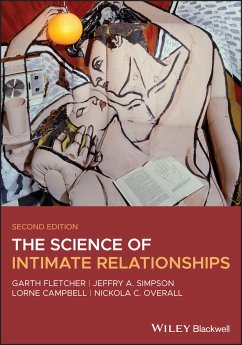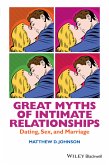Provides a unique interdisciplinary approach to the science of intimate human relationships
This newly updated edition of a popular text is the first to present a full-blooded interdisciplinary and theoretically coherent approach to the latest scientific findings relating to human sexual relationships. Written by recognized leaders in the field in a style that is rigorous yet accessible, it looks beyond the core knowledge in social and evolutionary psychology to incorporate material and perspectives from cognitive science (including brain-imaging studies), developmental psychology, anthropology, comparative psychology, clinical psychology, genetic research, sociology, and biology.
Written by an international team of acclaimed experts in the field, The Science of Intimate Relationships offers a wealth of thought-provoking ideas and insights into the science behind the initiation, maintenance, and termination of romantic relationships. The 2nd Edition features two new chapters on health and relationships, and friends and family, both of which shed new light on the complex links among human nature, culture, and romantic love. It covers key topics such as mate selection, attachment theory, love, communication, sex, relationship dissolution, violence, mind-reading, and the relationship brain.
The Science of Intimate Relationships, 2nd Edition is designed for upper-level undergraduate students of human sexuality, psychology, anthropology, and other related fields.
This newly updated edition of a popular text is the first to present a full-blooded interdisciplinary and theoretically coherent approach to the latest scientific findings relating to human sexual relationships. Written by recognized leaders in the field in a style that is rigorous yet accessible, it looks beyond the core knowledge in social and evolutionary psychology to incorporate material and perspectives from cognitive science (including brain-imaging studies), developmental psychology, anthropology, comparative psychology, clinical psychology, genetic research, sociology, and biology.
Written by an international team of acclaimed experts in the field, The Science of Intimate Relationships offers a wealth of thought-provoking ideas and insights into the science behind the initiation, maintenance, and termination of romantic relationships. The 2nd Edition features two new chapters on health and relationships, and friends and family, both of which shed new light on the complex links among human nature, culture, and romantic love. It covers key topics such as mate selection, attachment theory, love, communication, sex, relationship dissolution, violence, mind-reading, and the relationship brain.
- Provides a coherent and theoretically integrative approach to the subject of intimate relationships
- Offers an interdisciplinary perspective that looks beyond social and evolutionary psychology to many other scientific fields of study
- Includes two new chapters on 'Relationships and Health' and 'Friends and Family', added in response to feedback from professors who have used the textbook with their classes
- Presented by recognized leaders in the field of relationships
- Features PowerPoint slides and an online Teaching Handbook
The Science of Intimate Relationships, 2nd Edition is designed for upper-level undergraduate students of human sexuality, psychology, anthropology, and other related fields.
Dieser Download kann aus rechtlichen Gründen nur mit Rechnungsadresse in D ausgeliefert werden.









